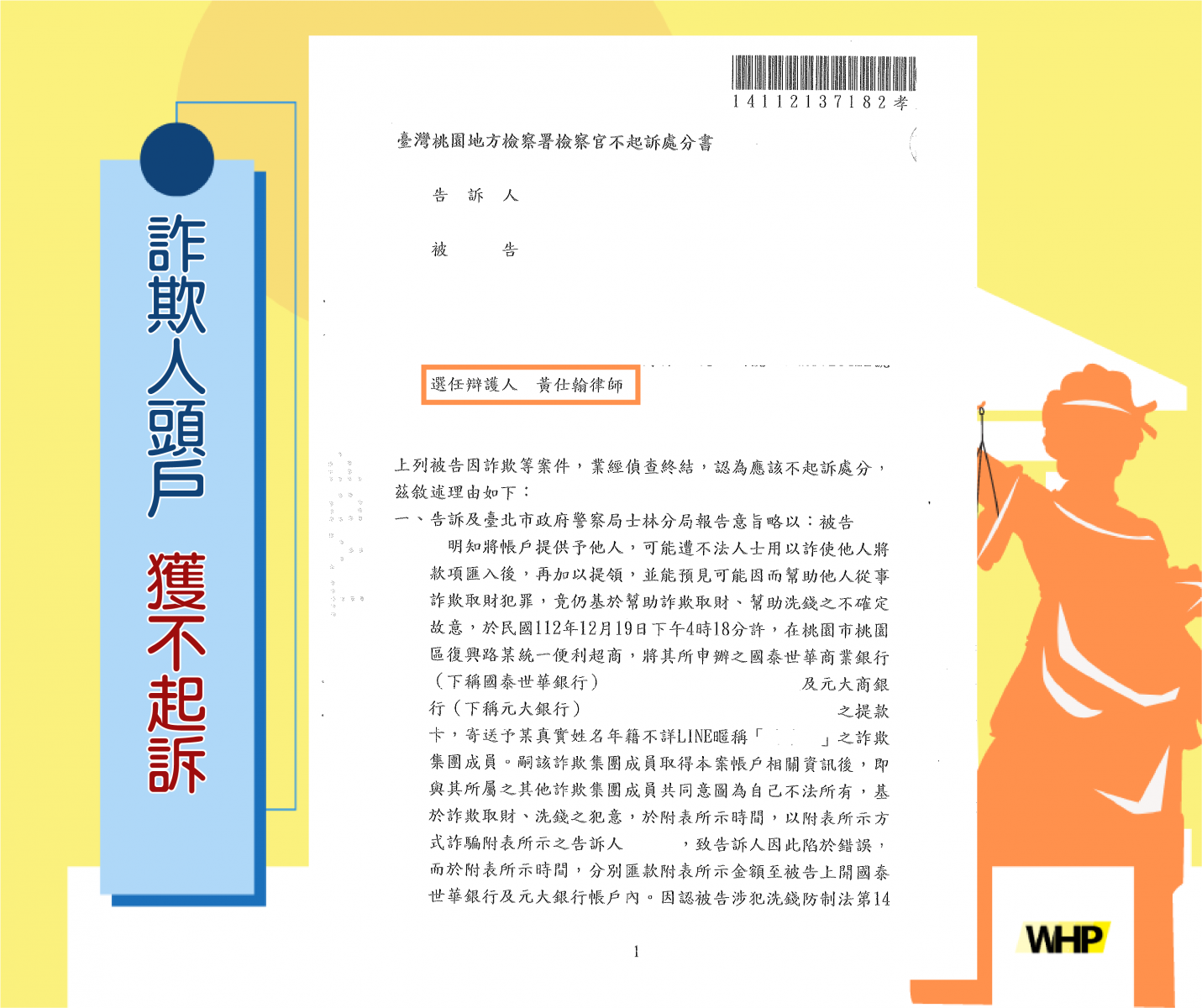首頁 >
| Successful acquittal of lawyer's dummy account defendant in fraud case

Relevant Legal Provisions
Criminal Law Article 284:Anyone who injures another person due to negligence shall be sentenced to no more than one year in prison, detention, or a fine not exceeding 100,000 NT dollars; if serious injury occurs, the sentence shall be no more than three years in prison, detention, or a fine not exceeding 300,000 NT dollars.
Criminal Law Article 287:Crimes under Article 277, Paragraph 1, Article 281, and Article 284 are subject to complaint-based prosecution. However, when a public servant commits a crime under Article 277, Paragraph 1 while performing their duties, this provision does not apply.
Facts and Reasons
The defendant (our client) experienced a decrease in income and, to supplement household expenses, found a domestic work opportunity on Facebook. The other party provided a company name and related employment contract. After verifying the company's existence, the defendant submitted their ATM card and related bank account information as requested. However, the defendant was unfortunately exploited in a fraud scheme. The plaintiff later filed a lawsuit after the defendant's funds were stolen by the fraudulent group.
Prosecutor's Disposition
The defendant in the above case, related to fraud and other offenses, has been cleared after the investigation concluded, and a decision of non-prosecution was made.
Upon review, the relevant conversation records clearly show that the defendant, in response to a domestic work advertisement, came into contact with a fraud group and was subsequently deceived. After being defrauded, the defendant reported the incident to the police. Therefore, it cannot be ruled out that the defendant is also a victim of fraud. Simply because the plaintiff transferred the stolen funds to a financial account does not provide sufficient grounds to infer that the defendant was involved in aiding the fraud or money laundering activities.
(Some details of the case have been adjusted or omitted to protect the parties' rights.)
Attorneys: Vincent Huang
-
08.06 2024
Drugs | Transporting Schedule II Drugs, Confession...
-
07.30 2024
Division of Inheritance | How to Calculate the Spo...
-
07.23 2024
Sexual Harassment | What Should You Do if You Are ...
-
07.16 2024
Fraud | Pregnancy Turns Out to Be a Scam
-
07.09 2024
Sex Crime | Momentary Fun of Secret Filming Leads ...
-
07.02 2024
Workplace Sexual Harassment | Protect Yourself Whe...
-
06.25 2024
Sued Criminally Just for Disagreeing to Reduce Ren...
-
06.18 2024
Obstruction of Sexual Autonomy | Distancing and Su...
-
06.11 2024
Unjust Enrichment | Lease Expired! Tenant Refuses ...
-
06.04 2024
Spending Money to Buy a House, Only to End Up with...
-
05.28 2024
Inheritance | What to Do If You Can't Pay Inherita...
-
05.21 2024
What to Do If You Buy a House with Unclear Ownersh...
-
05.14 2024
Drunk Driving | Arrested for Drunk Driving the Day...
-
05.07 2024
Hit-and-Run | Accused of Hit-and-Run After Confirm...
-
04.30 2024
The Responsibility of Faculty Harassing Students!